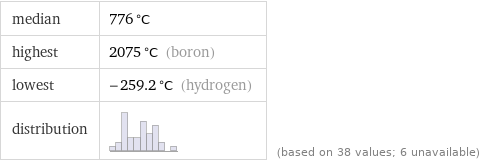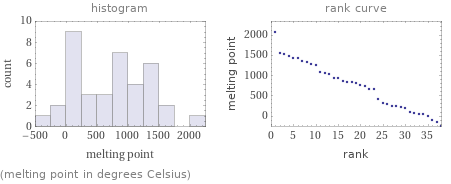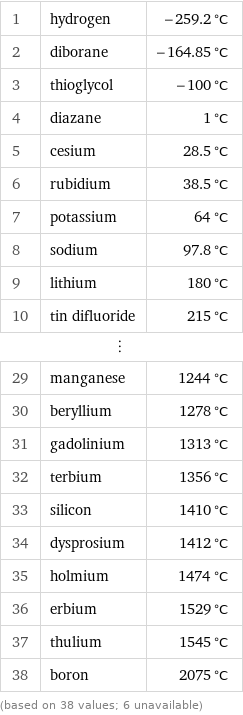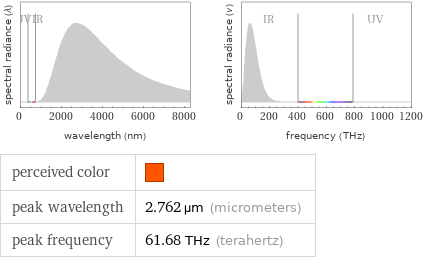Input interpretation

reductants | melting point
Summary

median | 776 °C highest | 2075 °C (boron) lowest | -259.2 °C (hydrogen) distribution | | (based on 38 values; 6 unavailable)
Entities with missing values

hydroxylamine | sodium borohydride | triethylsilane | diisobutylaluminum hydride | tin(II) sulfide | samarium(II) iodide (total: 6)
Distribution plots

(melting point in degrees Celsius)
Melting point rankings

1 | hydrogen | -259.2 °C 2 | diborane | -164.85 °C 3 | thioglycol | -100 °C 4 | diazane | 1 °C 5 | cesium | 28.5 °C 6 | rubidium | 38.5 °C 7 | potassium | 64 °C 8 | sodium | 97.8 °C 9 | lithium | 180 °C 10 | tin difluoride | 215 °C ⋮ | | 29 | manganese | 1244 °C 30 | beryllium | 1278 °C 31 | gadolinium | 1313 °C 32 | terbium | 1356 °C 33 | silicon | 1410 °C 34 | dysprosium | 1412 °C 35 | holmium | 1474 °C 36 | erbium | 1529 °C 37 | thulium | 1545 °C 38 | boron | 2075 °C (based on 38 values; 6 unavailable)
Unit conversions for median melting point 776 °C

1049 K (kelvins)

1429 °F (degrees Fahrenheit)

1888 °R (degrees Rankine)

620.8 °Ré (degrees Réaumur)

414.9 °Rø (degrees Rømer)
Comparison for median melting point 776 °C

524 °C below to 76 °C above typical temperature of magma (700 to 1300 °C)

120.8 °C below large log fire temperature (1170 K)
Blackbody information for median melting point 776 °C (degrees Celsius)

perceived color | peak wavelength | 2.762 µm (micrometers) peak frequency | 61.68 THz (terahertz)
Corresponding quantities

Thermodynamic energy E from E = kT: | 90 meV (millielectronvolts)

Blackbody energy flux Φ from Φ = σT^4: | 68701 W/m^2 (watts per square meter)

Approximate luminous exitance from a planar blackbody radiator perpendicular to its surface: | 25 lx (lux)